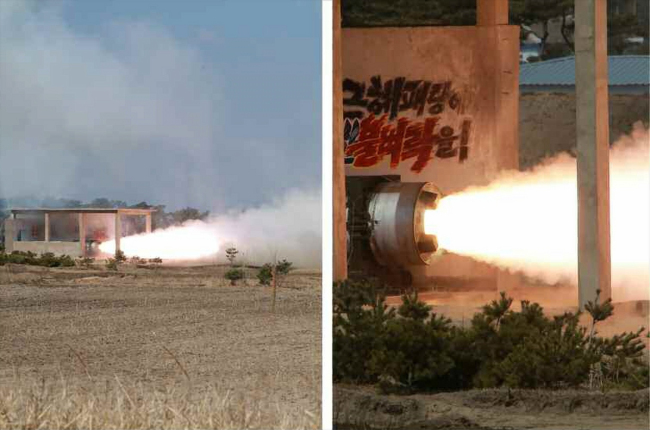The South Korean military confirmed Thursday that North Korea is developing solid-fuel rockets — indicating that it is continuing to advance its missile attack capabilities — as President Park Geun-hye ordered security forces to strengthen their vigilance against further provocations.
Earlier in the day, North Korea’s state media Korea Central News Agency claimed that its leader Kim Jong-un guided a successful ground test of high-powered solid-fuel rocket engine, saying that the supposed breakthrough helped boost the power of the ballistic missiles.
 |
| Photos revealed Thursday by Rodong Sinmun, the mouthpiece of North Korea’s ruling Workers’ Party, shows what Pyongyang claims to be a ground test of high-powered solid-fueled rocket engine. Yonhap |
“The Defense Ministry) believes that North Korea is at a stage of developing solid fuel (for missiles). … We believe it is attempting to boast the progress of its nuclear and missile programs,” said the ministry spokesman Moon Sang-kyun.
North Korea is currently using solid fuel for its KN-02 and FROG missiles, which have a range of under 200 kilometers. Scud, Rodong and other missiles with longer range are liquid-propellant.
The performance of a solid-fuel rocket is lower compared to that of liquid fuel. Experts say it is also harder to control since it continues to burn fuel upon ignition while liquid-fuel rocket has a device to control the fuel injection to adjust the altitude.
But the solid-fuel rockets can be stored for longer periods and launch on short notice. This means they are less likely to be exposed to satellites before launch, as the fuel does not have to be injected shortly before launch.
“Switching to solid fuels means that (North Korea) will be able to swiftly fire missiles any time,” Moon said.
South Korea is currently working to establish the “Kill Chain” missile defense system by the early 2020s, which can detect, identify and strike ballistic missiles within less than 30 minutes. But there has been concern that switching to solid fuels may allow the North to significantly shorten the time so its missiles can elude the defense system.
South Korean President Park Geun-hye responded by ordering a nationwide alert against the North’s comments.
“On threats by North Korea, the president ordered the nation to be on alert so the security of the people will not be compromised,” said Kim Sung-woo, chief presidential secretary for public affairs.
“She also requested the military to be fully prepared for any reckless provocations by the North.”
The remarks came a day after the North continued its saber rattling, threatening to attack Cheong Wa Dae.
The military said that it has been on full alert since the communist country conducted a nuclear testing on Jan. 6, in violation of the U.N. Security Council resolutions. Pyongyang also carried out a long-range rocket launch on Feb. 7, prompting the U.N. to pass what has been called the strongest sanctions in decades against it earlier this month.
The U.N. Human Rights Council on Wednesday adopted a resolution that requested instituting a group of experts to verify crimes against humanity committed by North Korea, and hold the perpetrators responsible. Delegations from China and Russia said they will “disassociate” themselves from the consensus.
South Korea’s Foreign Ministry welcomed the adoption, and said that support for the resolution underscores the “deep concerns” of the international community about the human rights status in the reclusive state.
North Korea’s diplomatic mission in Geneva said the country would reject the resolution, claiming that it was politically motivated.
By Yoon Min-sik (minsikyoon@heraldcorp.com)

